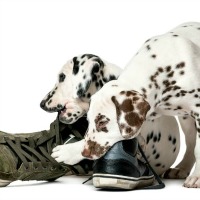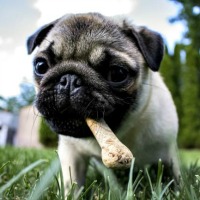FYI: If you buy something through a link on this site I may earn a commission - at NO extra cost to you.
Puppy Teeth Information & Help
On this page you'll find loads of information about puppy teeth, teething, care and much more.
It has answers to all the most common questions new puppy owners ask, including questions like....
- When does a puppy gets his first teeth?
- When will my puppy start losing his baby teeth?
- How can I help my teething puppy?
- How do I keep my puppy's teeth clean and healthy?
Those tiny little puppy teeth are precious... and sharp... and are replaced by adult teeth all too quickly. If you have questions or concerns that aren't answered here please feel free to contact me. I can't promise to have the answers, but I will do my very best to help.
Puppy Teeth Information & FAQ's
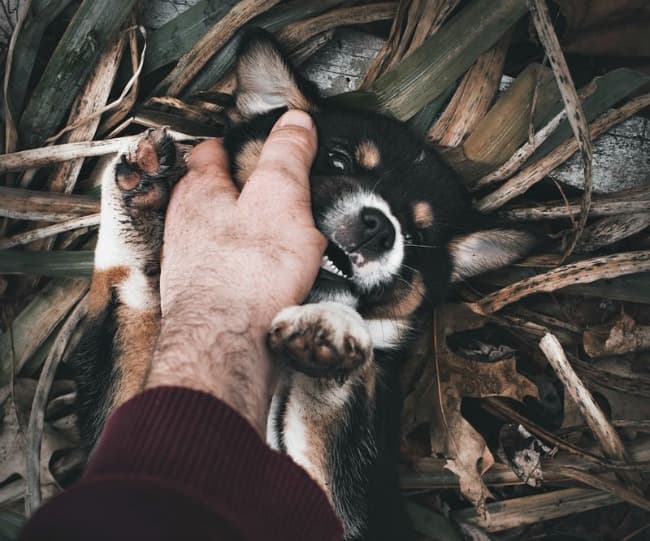
When will my puppy Get his teeth?
Newborn puppies are born with their tiny teeth buried below the gums, but within 2 - 3 weeks those needle-sharp points begin to push their way upwards and break through the gum line.
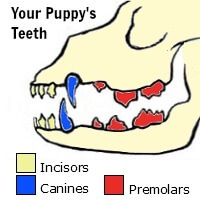
The first ones to appear are the 'Incisors' (which are the tiny ones right at the front of his mouth), there are twelve of these, six in the top jaw and six in the bottom.
Next are the four 'Canines' (these are the long 'fangs'), there are two in the top and two in the bottom. These come through at about 4 weeks old.
Finally, the twelve Pre-molars which are the big 'double' teeth in the back of his mouth. There are three top and three bottom on each side of his jaw. These are usually all in place by 8 weeks of age.
This makes a total of 28 'baby teeth' (aka 'milk' or 'deciduous' teeth), the image on the right shows how all of this looks and will help you identify your puppy's teeth properly.
Although these teeth are very small, they're also very SHARP... and puppy nipping hurts!
When will my puppy lose his teeth?
Do puppy teeth fall out?
The simple answer to this is YES they do, and losing them usually happens in a specific order, and at a similar time, in most puppies.
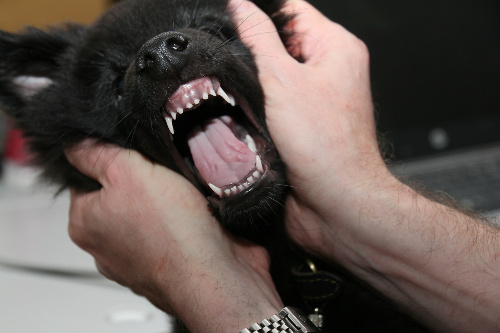
The big breeds do develop at a different rate from the smaller ones and there can be a fair amount of variation between puppies in terms of exactly when teething begins, and ends.
This isn't just isolated to breed-specific differences either, every puppy is unique and no two will grow and mature at exactly the same rate.
This puppy teeth information timeline below is only a guide and fits an 'average' puppy, your little pup may be faster, or slower. One is not better than the other! He will eventually have his 'grown up' teeth and there's no need to try to hurry it along.
3 to 4 Months: The Incisors are the first to come loose and begin to fall out, being replaced by the adult teeth as they do so.
4 - 5 Months: The Premolars and the Canines will usually start to push out the baby teeth during this time. The Canines may show up first, but usually these upper 'fangs' are the very last teeth to grow in fully.
6 -7 Months: All the permanent teeth should be in place by this age, but occasionally it can take a little longer.
Adult dogs usually have 42 adult (or permanent) teeth.
Why does my puppy have a 'double set' of teeth?
Sometimes the incoming adult teeth aren't successful in totally dislodging the baby ones who are already in place.
When this happens there may be a period of days, or even weeks, when your pup has a double 'set' or a double 'row' of teeth in some places.
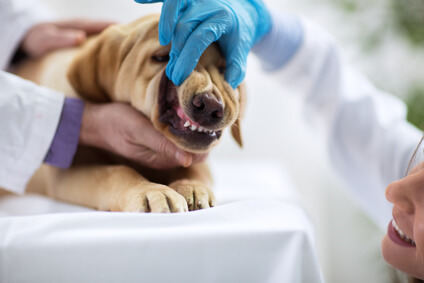
This is actually pretty normal and not something to worry about too much. For most pups this is a short-lived situation and the loose puppy teeth fall out all by themselves.
But occasionally they refuse to budge, and if your pup has had all of his permanent teeth in place for a month or more and yet still has some deciduous ones hanging on, then it's a good idea to discuss it with your vet.
Your puppy's mouth wasn't designed to hold two sets of teeth at the same time and obviously it gets a bit crowded in there if the baby ones don't fall out.
This can cause discomfort or even pain, and stuff (food, sticks and all the random stuff your pup so enjoys chewing on!) can get stuck in them much more easily.
There's also the higher risk of tooth decay or gum disease because when your dog's teeth are too close together not only do food particles get trapped there, they're also much more difficult to keep clean. Removing these retained puppy teeth isn't a difficult procedure and your vet will be happy to explain it all to you if you ask.
Suggested Puppy Dental Products....
How do I help a teething puppy?
If you're the parent of a baby or child who is past that teething stage, you'll have some idea of what you're facing when your pup starts to go through that whole process.
If you don't have kids then you might be in for some surprises :)
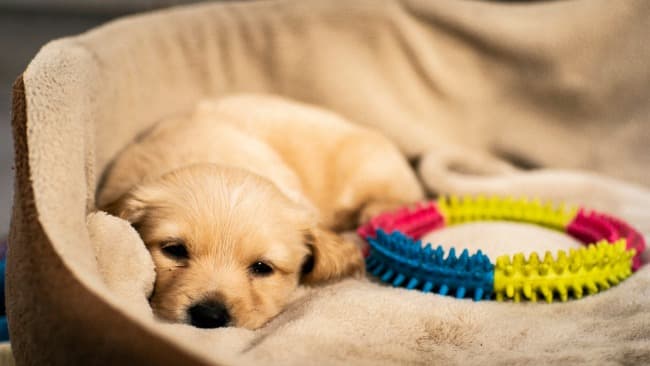
While your little one is busy losing his baby teeth and growing in those big, beautiful adult ones, his behavior may go through some changes.
Puppies who are teething like to chew - a LOT!
Making sure he has safe, sturdy and appropriate toys to chew on aids the correct development and growth of his teeth and gums... not to mention reduces wear and tear on your belongings!
Click HERE to find out how to choose the best toys for your pup and also find links to the brands and designs I recommend and visit my Puppy Teething page for all the information you need to get through this stage.
How can I keep my puppy's teeth clean & healthy?
Good puppy dental care means helping your little one's shiny new adult teeth stay clean, white and strong.
There are all sorts of products available these days that will help you keep your puppy's mouth a healthy and happy place :)
This includes dog toothpastes and toothbrushes, mouthwashes or sprays, food supplements, and treats designed to keep tartar at bay and/or freshen breath... and more.
There are lots of great puppy toys designed for the teething stage.
These not only keep your pup's teeth focused on his own possessions, but are also designed to help keep teeth, gums and jaws strong and healthy.
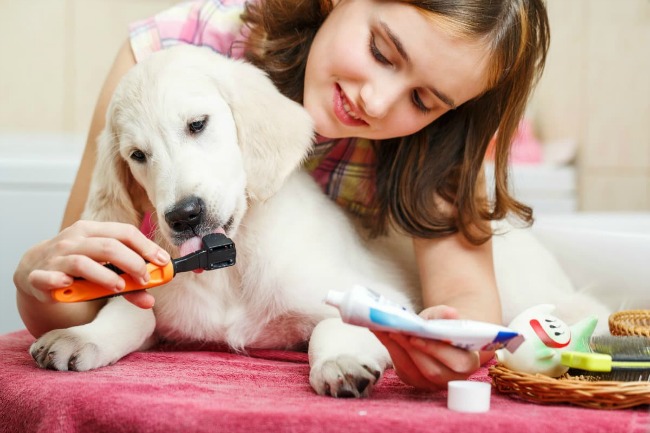
Feeding a dry puppy kibble is better for your puppy's teeth than soft canned food, but it won't prevent tartar build-up or tooth decay.
A raw food diet complete with natural bones is even better for dental health, but this isn't recommended for puppies due to their unique nutritional needs.
If you have a mature dog, then feeding him raw dog food can be a great way to keep him healthy all over as well as keep his dental work in tip-top shape.
The most popular choice is often a premium dry puppy food diet, regular tooth-brushing, and a range of toys/treats that help to keep his teeth clean. It's also very important, have your vet check your pup's mouth regularly to make sure all is well. To learn how to brush your puppy's teeth correctly check out my Brushing Puppy Teeth page.
Click here to check out an article on puppy teeth which has been written exclusively for this website by Dr Megan Teiber, DVM
you might also like...
- Home
- About Puppy Teeth
FTC Disclosure: Some pages on this site contain affiliate links. I may earn on qualified purchases.




